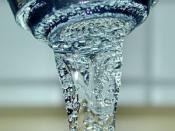' Water! Water! Water! ': These are the words of a person dying from thirst, which me or you might be hearing or even crying it out aloud in the near future, because human being's most serious problem and dilemma in the 21st century might not be war or hunger or disease or the collapse of civic order, it may be the lack of Fresh Water, according to a United Nation's (UNESCO) report.
At present 1.1 billion people lack access to clean water, while 2.4 billion lack access to proper sanitation, nearly all of them in the developing countries. Faced with "disinterest at the leadership level and a world population not fully aware of the magnitude of the problem", the global water crisis will reach astonishing colossal levels in the years ahead.
Although water is the commonest substance on earth, only 2.53 per cent of it is fresh, while the rest is salt water.
And of the freshwater, two thirds is in the form of glaciers and permanent snow cover. What is available, in lakes, rivers, aquifers (ground water) and rainfall run-off, is now increasingly coming under strain from urban areas, industries in the developed world, and agriculture in the developing world which is responsible for 70 % of all the water use in the world.
Pollution from industries, agriculture and urban areas such as cities and towns, adds another severe pressure on fresh water supply. About two million tons of wastes are dumped every day into rivers, lakes and streams, with one liter of waste water sufficient enough to pollute about eight liters of fresh water.
The worst and direct effects of fresh water scarcity will without a doubt be on health. Water-borne illnesses, such as stomach infections like diarrhea, are caused by drinking polluted/contaminated water; vector-borne diseases,



Please don't steal any more essays
I noticed that nearly all your submitted essays (many submitted twice, three times, four times) have been copied from other sites. I'm not sure about this one...
1 out of 2 people found this comment useful.